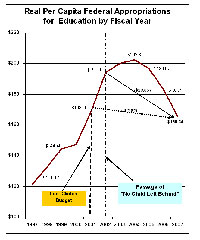 Scott Lilly provides an excellent analysis of how the Bush administration has been drastically cutting education and increasing military and 'homeland security' spending over the last several years. The Center for American Progress' Lilly gives a useful historical acount of how Bush has backtracked on education funding. See the great chart for a quick review -
Scott Lilly provides an excellent analysis of how the Bush administration has been drastically cutting education and increasing military and 'homeland security' spending over the last several years. The Center for American Progress' Lilly gives a useful historical acount of how Bush has backtracked on education funding. See the great chart for a quick review -The Bush slogan of “leave no child behind” seemed to imply that he recognized an urgency to the problem that surpassed the commitment of both Clinton and Bush’s 2000 opponent, Al Gore....
...In January of 2003 the President signed the “No Child Left Behind Act,” which authorized a more than 50 percent increase in federal assistance to local schools over the course of the next five years. The budget which he presented to Congress a few weeks later funded only part of that increase, but the direction was still upward and real per capita federal spending for education increased to almost $200 in the Fiscal Year 2003 budget. But that is where it stopped. Fiscal 2004 was essentially flat and since then education funding has been in a nosedive....
...But the “reverse” was not complete until this morning, when the President sent Congress his fiscal 2007 budget request. The $54.4 billion that the President this morning asked the Congress to appropriate for the Department of Education for the coming year is $2 billion below the level available for the current year. Real per capita spending under that budget will plummet to $165, or $3 less than the level contained in the appropriation bill signed by President Clinton a few weeks before Bush was sworn into office.
The Bush team will no doubt argue that money can’t fix everything—that there are issues in education that won’t go away no matter how much money you throw at them. That may well be true, but it is also true that you can’t expect class sizes to go anywhere but up and you can’t expect teacher quality to go anywhere but down if you reduce the funds available to local school districts. The burden of the increased testing now mandated by the federal government simply adds to the downward financial pressure.
Even more distressing is the fact that the new Bush budget appears to plan for continued cuts in federal support of local schools for the foreseeable future. All of the increased support of local schools achieved during the Clinton administration (in real per capita spending by the Department of Education) may well be eliminated in the final two budgets of the Bush administration—the administration that used education as a measure of its compassion.
This is necessary to offset a tiny fraction of the debt being created by tax cuts focused on the most well-to-do in our society.
FULL ARTICLE by Scott Lilly.
--------------------------------------------------
For the mainstream coverage of the Federal Budget - see
COMMON DREAMS

Published on Monday, February 6, 2006 by the Associated Press
Bush's $2.77 T Budget Boosts Defense
by Martin Crutsinger
President Bush sent Congress a $2.77 trillion budget plan on Monday that would boost spending in the war against terror but squeeze a wide swath of other government programs to deal with exploding budget deficits.
Bush, hoping to get his domestic agenda back on track after a year of political setbacks, unveiled a budget blueprint with a heavy emphasis on keeping the country strong militarily. It would also make his first-term tax cuts permanent, at a cost of $1.4 trillion over 10 years, and still achieve his goal of cutting the deficit in half by 2009.
Almost one-third of the targeted programs are in education including ones that provide money to support the arts, vocational education, parent resource centers and drug-free schools.
Senate Minority Leader Harry Reid Achieving these two goals constrained Bush's efforts to offer new initiatives although he did put forward a few mostly modest programs to deal with American anxieties about global competition, soaring energy costs and skyrocketing medical bills.
But among the losers were 141 government programs that Bush sought to sharply reduce or eliminate entirely. Almost one-third of the targeted programs are in education including ones that provide money to support the arts, vocational education, parent resource centers and drug-free schools....
FULL ARTICLE
--------------------------
The Center for American Progress's John Podesta, Cassandra Butts and John Halpin have provided a good critique of Bush's overall budget with good suggestions for how to counter the conservative spin on the issues -
http://www.americanprogress.org
More info -
www.americanprogress.org

No comments:
Post a Comment